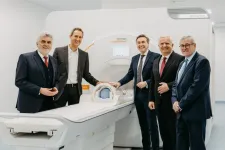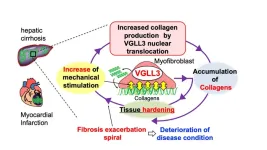(Press-News.org) A new study from researchers from Brigham and Women’s Hospital, a founding member of the Mass General Brigham healthcare system, has shed new light on the best strategies hospitals can use for medication reconciliation, the critical and difficult task of updating and verifying a patient’s medication lists and orders, regardless of where they are in the health care system. The study, published in BMJ Quality and Safety, is a new analysis of data from the second Multi-center Medication Reconciliation Quality Improvement Study (MARQUIS2).
“We found that taking a ‘best possible’ medication history while the patient is still in the emergency department is much more effective than taking it later when the patient has already been admitted to the hospital,” said corresponding author Jeffrey L. Schnipper, MD, MPH, Research Director of the Brigham’s Division of General Internal Medicine and Primary Care, a professor of medicine at Harvard Medical School and principal investigator of the MARQUIS2 study. “These findings provide specific guidance that hospitals and health systems can use to improve medication safety and protect patients from discrepancies.”
While electronic health records have improved many aspects of medicine, the existence of multiple electronic records from different healthcare providers introduces challenges for hospitals when establishing a patient’s complete and accurate medication history. Medication reconciliation is particularly challenging during care transitions, including admission to and discharge from the hospital. And while not every medication discrepancy causes harm, medical patients experience, on average, at least one potentially harmful medication discrepancy per hospitalization.
“This is one of those areas where people just assume hospitals can always do it correctly, but it’s actually pretty difficult in practice,” said Schnipper. “The average patient coming to a hospital has multiple doctors, is taking several different medications, and may not be consistently taking what they’ve been prescribed.”
Improving medication safety has been a National Patient Safety Goal of The Joint Commission since 2005, but medication reconciliation has proven a challenge for hospitals, largely due to factors like limited resources and difficulty implementing complex workflows.
“Here we are almost 20 years later, and we still haven't quite figured it out,” added Schnipper.
The MARQUIS2 study was conducted at 18 diverse hospitals in North America over 18 months, providing a toolkit and mentored implementation to improve medication reconciliation procedures. The study found that on average, medication discrepancies decreased by about 5% per month, and by almost two-thirds overall, when the toolkit was implemented. In their new report, the researchers further analyzed the results to determine which specific interventions were most effective.
They found that the most effective interventions were taking a comprehensive medication history before hospital admission, while patients are still in the emergency department, and reconciling medications upon discharge by comparing regimens prior to admission, during the hospitalization, and in discharge orders.
“We need to get hospitals focused on taking the best possible medication history in the emergency department, and then doing good discharge medicine reconciliation on top of that, especially for the highest risk patients,” said Schnipper. “Supporting those two efforts would go a long way toward improving patient safety.”
While the MARQUIS2 study has helped start the process, the researchers acknowledge that it will take more research to fully address the complex issues that impact medication safety.
“What we’ve done so far applies to hospitals, where we know people are on a lot of medications, but there are other care settings where medication discrepancies occur,” said Schnipper. “Some of our next steps are to look at outpatient settings, like doctor’s offices, as well as double transitions, where a patient spends time in another facility such as rehabilitation before going home.”
In the short term, the researchers have made the MARQUIS2 toolkit available at no cost to hospitals and are providing consultation to hospitals to help guide them through the process of implementation.
“We want to scale this up as much as possible, to as many hospitals that are ready for it,” said Schnipper. “That’s where we can make the biggest immediate impact.”
Disclosures: Schnipper and co-author Amanda S Mixon received renumeration from the American Society of Health-System Pharmacists to develop their best possible medication history training curriculum. Schnipper also received funding from Synapse Medicine for a study to evaluate the effects of their medication decision support software on hospital pharmacists’ medication recommendations.
Funding: This study was supported by the Agency for Healthcare Research and Quality (R18HS023757).
Paper cited: Schnipper, JL et al. “What works in medication reconciliation: an on-treatment and site analysis of the MARQUIS2 study” BMJ Quality and Safety DOI: 10.1136/bmjqs-2022-014806
END
Study determines most effective ways for hospitals to reduce medication errors
Consolidating a patient’s medication lists before hospital admission and upon discharge significantly reduced the number of medication discrepancies in a new analysis of the MARQUIS2 study
2023-03-22
ELSE PRESS RELEASES FROM THIS DATE:
New invention: The oxygen-ion battery
2023-03-22
Lithium-ion batteries are ubiquitous today - from electric cars to smartphones. But that does not mean that they are the best solution for all areas of application. TU Wien has now succeeded in developing an oxygen-ion battery that has some important advantages. Although it does not allow for quite as high energy densities as the lithium-ion battery, its storage capacity does not decrease irrevocably over time: it can be regenerated and thus may enable an extremely long service life.
In addition, oxygen-ion batteries can be ...
Europe’s most powerful 7-tesla MRI machine in operation
2023-03-22
On Wednesday, 22 March 2023, at Otto von Guericke University Magdeburg, Europe’s most powerful 7-Tesla magnetic resonance imaging (MRI) machine was formally inaugurated. The symbolic push of the button to start the high-performance MRI machine for future research work took place in the presence of the Minister of Science for Saxony-Anhalt, Prof. Dr. Armin Willingmann.
Henceforth, the MAGNETOM Terra.X Impulse Edition will enable brain functions and structures to be mapped and measured on site with a previously unachievable level of precision. “With ...
Journal of Pharmaceutical Analysis articles spot drug targets for key pathophysiologies
2023-03-22
As the search for high-quality pharmaceutical drugs continues, researchers also continue spending countless hours discovering the underlying mechanisms of drug action. Knowing various pathophysiological mechanisms dramatically expedites the process of drug discovery. A recent example includes the discovery of the broad-spectrum anti-inflammatory effects of inosine, a nucleoside found in transfer RNAs, by researchers in China. These findings were made available online on 22 October 2022 and subsequently published in Volume 13, Issue 1 of Journal of Pharmaceutical Analysis (JPA) on 1st January 2023.
The ...
Performance of OncoK9® in real-world veterinary practice mirrors clinical validation study
2023-03-22
SAN DIEGO, March 22, 2023 — PetDx® – The Liquid Biopsy Company for Pets™ published a study today showing that OncoK9®, its multi-cancer early detection test for dogs using next-generation sequencing (NGS) technology, performs similarly in real-world veterinary practice settings as in the CANcer Detection in Dogs (CANDiD) study, the test’s landmark clinical validation study. Appearing in the Journal of the American Veterinary Medical Association, the new study examined the clinical experience with 1,500 consecutive blood samples submitted ...
New method shrinks 3D images of cells for faster storage and retrieval
2023-03-22
Single-cell analysis is a powerful biomedical technique used in various fields of biology and medicine to identify rare cell populations, track cell development and differentiation, understand disease mechanisms and develop personalized therapies, but it generates large amounts of data that can be difficult to manage. An international team of researchers led by Demetri Psaltis of the Swiss Federal Institute of Technology Lausanne and Pietro Ferraro of the Institute of Applied Sciences and Intelligent Systems has demonstrated an effective encoding strategy for single-cell tomograms that greatly streamlines ...
Sylvester researchers identify white blood cells called neutrophils as major culprits in treatment resistance of pancreatic cancer
2023-03-22
MIAMI, FLORIDA (EMBARGOED UNTIL WEDNESDAY, MARCH 22, 2023 AT 10 A.M. ET) – Researchers have shown for the first time exactly how immature neutrophils – white blood cells that are an important part of the immune system – are hijacked by pancreatic cancers to drive immunosuppression and treatment resistance. The study, led by investigators at Sylvester Comprehensive Cancer Center at the University of Miami Miller School of Medicine, is published in Cancer Discovery, a journal of the American Association for Cancer Research.
The paper describes a previously unrecognized signaling circuit in pancreatic cancer that instigates immunosuppression ...
Bilayer PET/PVDF substrate-reinforced solid polymer electrolyte improves solid-state lithium metal battery performance
2023-03-22
Effective energy storage is paramount to society’s transition to renewable energy. Lithium metal batteries (LMBs) have the potential to double the amount of energy stored in a single charge compared to current lithium ion batteries (LIBs), but lithium dendrite growth and electrolyte consumption in current LMB technologies are hindering battery performance. Substrates for solid polymer electrolytes (SPEs) offer a potential solution to current LMB limitations, but SPEs require their own optimization prior to integration into all-solid-state LMB (ASSLMB) systems.
A ...
Seniors’ use of urinary-tract infection antibiotics halved
2023-03-22
As an international study involving University of Gothenburg researchers has shown, a decision tool for health professionals has proved capable of halving the use of antibiotics against urinary tract infections while maintaining patient safety.
The study, now published in The BMJ, comprises a total of 1,041 frail older people at 38 senior care homes in the Netherlands, Norway, Poland, and Sweden. A group of researchers at the University of Gothenburg and Region Västra Götaland has been running the Swedish part of the study, ...
New medicine from Norwegian university spin-off extends terminally-ill cancer patients’ lives
2023-03-22
A promising cancer drug that targets only cancer cells has been developed by researchers from the Norwegian University of Science and Technology (NTNU) and a university spin-off company, APIM Therapeutics.
NTNU has been responsible for the basic research. APIM Therapeutics has used the basic research to develop the medicine.
It has taken 18 years and more than EUR 20 million.
The medicine has now been tested on 20 cancer patients who were terminally ill. They had tried all available treatments, and as a last resort they opted ...
The single protein that causes the fibrosis death spiral
2023-03-22
Fukuoka, Japan—Researchers from Kyushu University have found how a single mechanosensitive protein induces the process that thickens and scars tissue, known as fibrosis. The protein, called VGLL3, was shown to contribute to fibrosis in multiple organs.
The team hope their findings will lead to new treatments against fibrosis, a pathology that is attributed to 45% of all deaths in industrial nations. Their study was published in Nature Communications.
In response to any injury, the body immediately begins a stream of events. Blood coagulates, the tissue ...
LAST 30 PRESS RELEASES:
FAU Harbor Branch awarded $900,000 for Gulf of America sea-level research
Terminal ileum intubation and biopsy in routine colonoscopy practice
Researchers find important clue to healthy heartbeats
Characteristic genomic and clinicopathologic landscape of DNA polymerase epsilon mutant colorectal adenocarcinomas
Start school later, sleep longer, learn better
Many nations underestimate greenhouse emissions from wastewater systems, but the lapse is fixable
The Lancet: New weight loss pill leads to greater blood sugar control and weight loss for people with diabetes than current oral GLP-1, phase 3 trial finds
Pediatric investigation study highlights two-way association between teen fitness and confidence
Researchers develop cognitive tool kit enabling early Alzheimer's detection in Mandarin Chinese
New book captures hidden toll of immigration enforcement on families
New record: Laser cuts bone deeper than before
Heart attack deaths rose between 2011 and 2022 among adults younger than age 55
Will melting glaciers slow climate change? A prevailing theory is on shaky ground
New treatment may dramatically improve survival for those with deadly brain cancer
Here we grow: chondrocytes’ behavior reveals novel targets for bone growth disorders
Leaping puddles create new rules for water physics
Scientists identify key protein that stops malaria parasite growth
Wildfire smoke linked to rise in violent assaults, new 11-year study finds
New technology could use sunlight to break down ‘forever chemicals’
Green hydrogen without forever chemicals and iridium
Billion-DKK grant for research in green transformation of the built environment
For solar power to truly provide affordable energy access, we need to deploy it better
Middle-aged men are most vulnerable to faster aging due to ‘forever chemicals’
Starving cancer: Nutrient deprivation effects on synovial sarcoma
Speaking from the heart: Study identifies key concerns of parenting with an early-onset cardiovascular condition
From the Late Bronze Age to today - Old Irish Goat carries 3,000 years of Irish history
Emerging class of antibiotics to tackle global tuberculosis crisis
Researchers create distortion-resistant energy materials to improve lithium-ion batteries
Scientists create the most detailed molecular map to date of the developing Down syndrome brain
Nutrient uptake gets to the root of roots
[Press-News.org] Study determines most effective ways for hospitals to reduce medication errorsConsolidating a patient’s medication lists before hospital admission and upon discharge significantly reduced the number of medication discrepancies in a new analysis of the MARQUIS2 study






